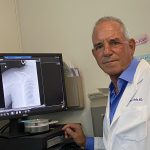With a new Congress and many new legislators in key leadership positions, your support today will help RheumPAC start the year off strong.
Search results for: Telemedicine
ACR Advocacy: 2020 Year in Review
As a new year begins, Government Affairs Committee Chair Blair Solow, MD, takes stock of ACR advocacy wins in 2020 and issues to watch in 2021, including workforce issues, continued telemedicine access, prior authorization relief, Medicare reimbursement and drug pricing.

Telerheumatology: What’s Next?
In an ACR Convergence session, two rheumatologists discussed how COVID-19 changed the use of telemedicine, how payers reacted and which changes are likely permanent and which are likely to be temporary.

Marcus Snow, MD, FACR, Assumes Chair of the Committee on Rheumatologic Care
Marcus Snow, MD, FACR, had his first exposure to rheumatology in a rotation during his residency at the University of Nebraska Medical Center, Omaha. James O’Dell, MD, Theodore Mikuls, MD, Jay Moore, MD, Lynn Klassen, MD, and other physicians showed how rheumatology could be the perfect mix of a narrow clinical focus with interesting patient…

The Personal Side of COVID-19: A Q&A with Elna Schiopu, MD
Dr. Schiopu has experienced the COVID-19 pandemic response from both clinical and research perspectives. She recently discussed her experiences with The Rheumatologist.

9 Lessons on Patient Empowerment
ACR CONVERGENCE 2020—In her ARP keynote address on Friday, Nov. 6, Empowering Patients to Make an Impact on the Future of Healthcare, Jen Horonjeff, PhD, described a study in which researchers gathered data on pain and activity level among arthritis patients. In her view, the study provided a cautionary tale. Researchers expected the study subjects…

Early Lessons from the COVID-19 Pandemic: A Q&A with Chris Phillips, MD
As the COVID-19 pandemic stretches on, many clinicians are thinking about the lessons they’ve learned. Chris Phillips, MD, says rheumatology practices can no longer take their financial health for granted and flexibility is key.

The Pandemic in Rural America: A Q&A with Chris Morris, MD
In rural America, where rheumatology offices are fewer and farther between, the expansion of telemedicine has been a boon during the COVID-19 pandemic. However, lab closures and reduced hospital services have made monitoring patients’ medications more challenging.

Riding Out the Pandemic: A Q&A with Norman Gaylis, MD
Some aspects of community practice are normalizing amid the ongoing COVID-19 pandemic, but the financial fallout and the need for increased safety precautions remain challenging.

What Does the ‘New Normal’ Look Like? A Q&A with Jay Mehta, MD
With his clinic resuming in-person visits, Jay Mehta, MD, says his patients and staff have proved remarkably adaptable, embracing telemedicine during the early days of the pandemic and now facemasks during appointments.
- « Previous Page
- 1
- …
- 12
- 13
- 14
- 15
- 16
- …
- 23
- Next Page »